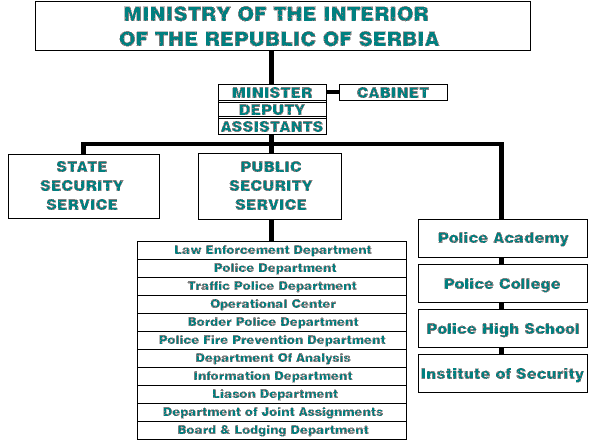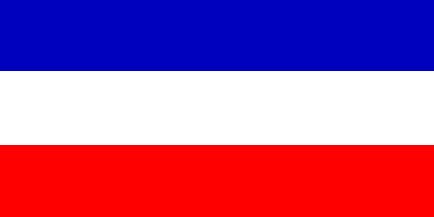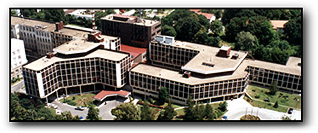




 The Ministry of Interior
conducts the State administration of the Internal Affairs. In the Republic of Serbia, Ministries conduct the State administration that is stipulated by laws and regulations. The Ministries enforce laws,regulations and general acts of the National Assembly and the Government as well as the general acts of the President.
The Ministry of Interior of the Kingdom of Serbs, Croats
and Slovenes was established in 1918 as the supreme authority and control power with the Department of State Security, Department of Public Security, Administration Department and the Department of
Self-management. The Department of Public Security dealt with the
safeguard of lives and property, crime prevention, traffic control,
gendarmerie, advanced training and disciplinary control of police
work. On 13 May 1944 the decision was made on establishing the
Department for protection of people (ONZ), the day that is celebrated as the Serbian police holiday.
The Ministry of Interior
conducts the State administration of the Internal Affairs. In the Republic of Serbia, Ministries conduct the State administration that is stipulated by laws and regulations. The Ministries enforce laws,regulations and general acts of the National Assembly and the Government as well as the general acts of the President.
The Ministry of Interior of the Kingdom of Serbs, Croats
and Slovenes was established in 1918 as the supreme authority and control power with the Department of State Security, Department of Public Security, Administration Department and the Department of
Self-management. The Department of Public Security dealt with the
safeguard of lives and property, crime prevention, traffic control,
gendarmerie, advanced training and disciplinary control of police
work. On 13 May 1944 the decision was made on establishing the
Department for protection of people (ONZ), the day that is celebrated as the Serbian police holiday.
Prior to the breakup of Yugoslavia, the State Security Service (an intelligence and secret police organization) monitored émigrés and domestic dissidents. The People's Militia troops (15,000) used to quell domestic disorders beyond control of regular police. And the Militia (regular police, 40,000) were used for routine law enforcement. The federal secretariat also controlled 15,000 troops in border guard units. In coastal areas, the border guards operated sixteen patrol boats in 1990.
The secretariats for internal affairs in the republics and autonomous provinces controlled the militia (regular police) forces in their territory. In 1990 there were an estimated 40,000 professional law enforcement officers. They were responsible for maintaining government communications, issuing travel documents to citizens, and registering foreign residents. The average militia officer was male, twenty-two years of age, and had completed his secondary education in special schools operated by the federal secretariat for internal affairs. Select militia officers were later sent for a university education.
The militia were organized into stations and substations in larger cities. They were involved in routine law enforcement as well as more sensitive cases involving ethnic groups. Cases ranged from physical attacks and harassment to homicide. In Pristina, site of a major university and a center of Albanian ethnic dissidence, every confrontation with authority had the potential to erupt into large disturbances between ethnic communities. In 1990 that city had seven militia stations and four substations, serving a population of 400,000.
With the proclamation of the Constitution of the Republic of Serbia in 1990, adjustments were made sphere of internal affairs and the new structure of today's organization of the Ministry of Interior was established. Serbia is a republic with a large number of police forces. As of 1995 the Serbian police had some 80,000 regular members and many more if the reserves are raised. In 1996 it was estimated that the heavily armed police force consisted of over 100,000 members responsible for internal security. And in 1997 it was reported that there were some 48,000 policemen in uniform, and that there were between 60,000 to 100,000 MUP members, although the latter number was regarded as probably exaggerated. According to daily newspapers, Serbia's MUP costs $6 billion, which is a large sum, since the Yugoslav Army budget is only $1 billion. The police are better supplied and paid than the Yugoslav Army, and are equipped with 150 armored personnel carriers and infantry combat vehicles and 170 mortars.
The total number of police deployed to Kosovo and Metohija is guarded as a state secret. Sources say that some 12,000 uniformed police are stationed in Kosovo, and according to some claims, another 10,000 plain-clothes policemen should be added to this number, as well as state security members. This figure constantly varies as reinforcements are regularly sent to Kosovo, so that it could be estimated that the police strength in Kosovo stands at some 30,000 to 40,000. Keeping such a large number of policemen in Kosovo represents a substantial item in the MUP's budget and, according to some estimates it equals the total budget for the entire Belgrade police force.
The Federal Criminal Code of the former Socialist Federal Republic of Yugoslavia still remains in force. Considerable confusion and room for abuse remain in the legal system because the 1990 Constitution of Serbia has not yet been brought into conformity with the 1992 Constitution of the Federal Republic of Yugoslavia. Federal law gives republic ministries of the interior sole control over the decision to monitor potential criminal activities, a power that is routinely abused. It is widely believed that authorities monitor opposition and dissident activity, eavesdrop on conversations, read mail, and wiretap telephones. Although illegal under provisions of Federal and Serbian law, the Federal post office registers all mail from abroad, ostensibly to protect mail carriers from charges of theft. The execution of duties in the Ministry of Interior is
uniformly organized on the territory of the Republic of
Serbia. The Headquarter of the Ministry is in Belgrade
and in accordance with the territorial division, the duties
and the assignments in the field of work of the Ministry
are also executed in district units - Secretariats in:
Belgrade, Kragujevac, Jagodina, Nis, Pirot, Prokuplje,
Leskovac, Vranje, Zajecar, Bor, Smederevo,
Pozarevcac, Valjevo, Sabac, Kraljevo, Krusevac,
Cacak, Novi Pazar, Uzice, Novi Sad, Sombor, Subotica,
Zrenjanin, Kikinda, Pancevo, Sremska Mitrovica,
Pristina, Kosovska Miotrovica, Pec, Prizren, Urosevac,
Gnjilane, Djakovica.
The execution of duties in the Ministry of Interior is
uniformly organized on the territory of the Republic of
Serbia. The Headquarter of the Ministry is in Belgrade
and in accordance with the territorial division, the duties
and the assignments in the field of work of the Ministry
are also executed in district units - Secretariats in:
Belgrade, Kragujevac, Jagodina, Nis, Pirot, Prokuplje,
Leskovac, Vranje, Zajecar, Bor, Smederevo,
Pozarevcac, Valjevo, Sabac, Kraljevo, Krusevac,
Cacak, Novi Pazar, Uzice, Novi Sad, Sombor, Subotica,
Zrenjanin, Kikinda, Pancevo, Sremska Mitrovica,
Pristina, Kosovska Miotrovica, Pec, Prizren, Urosevac,
Gnjilane, Djakovica.
